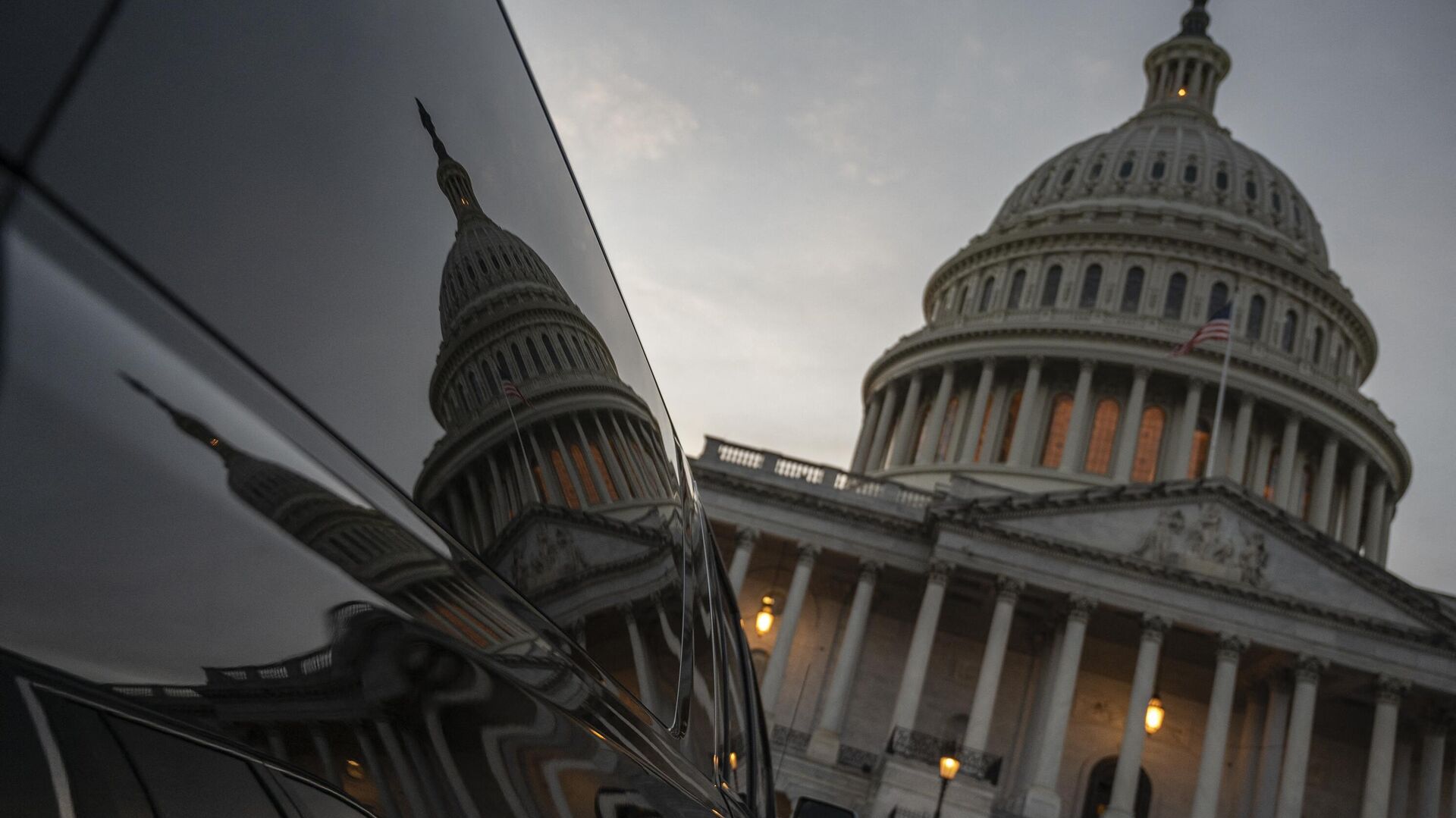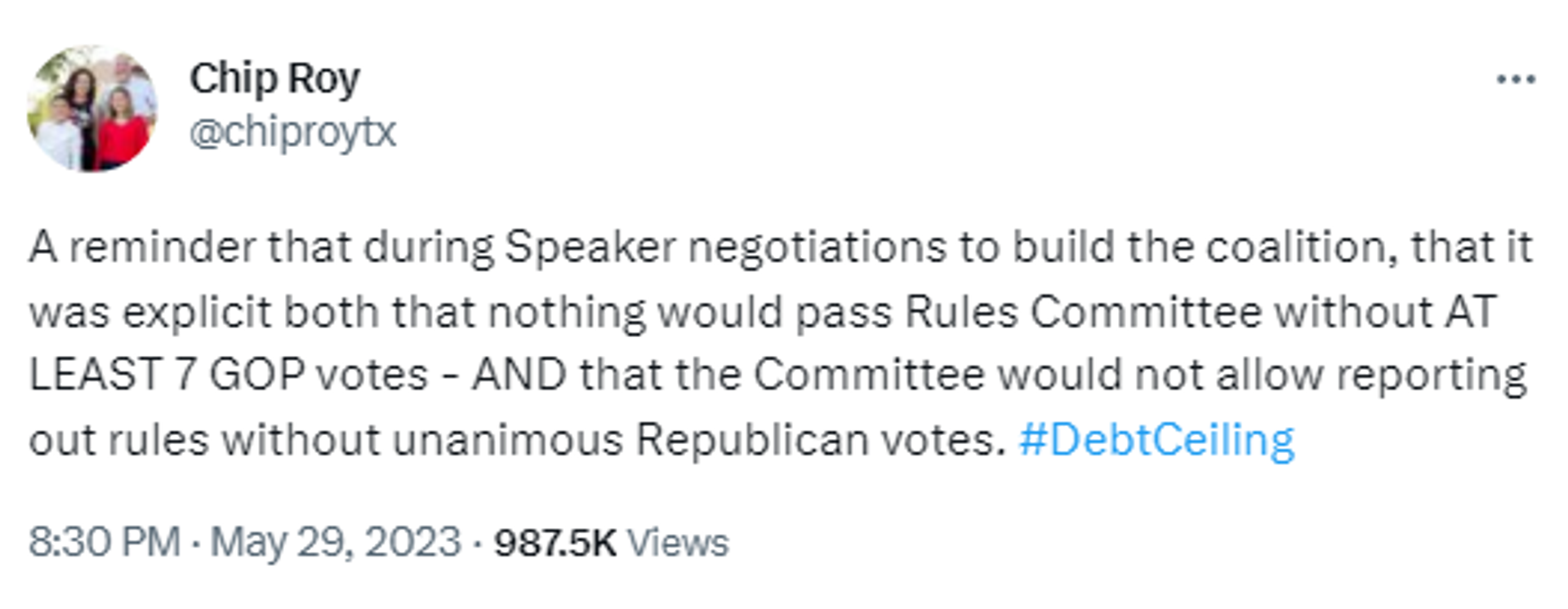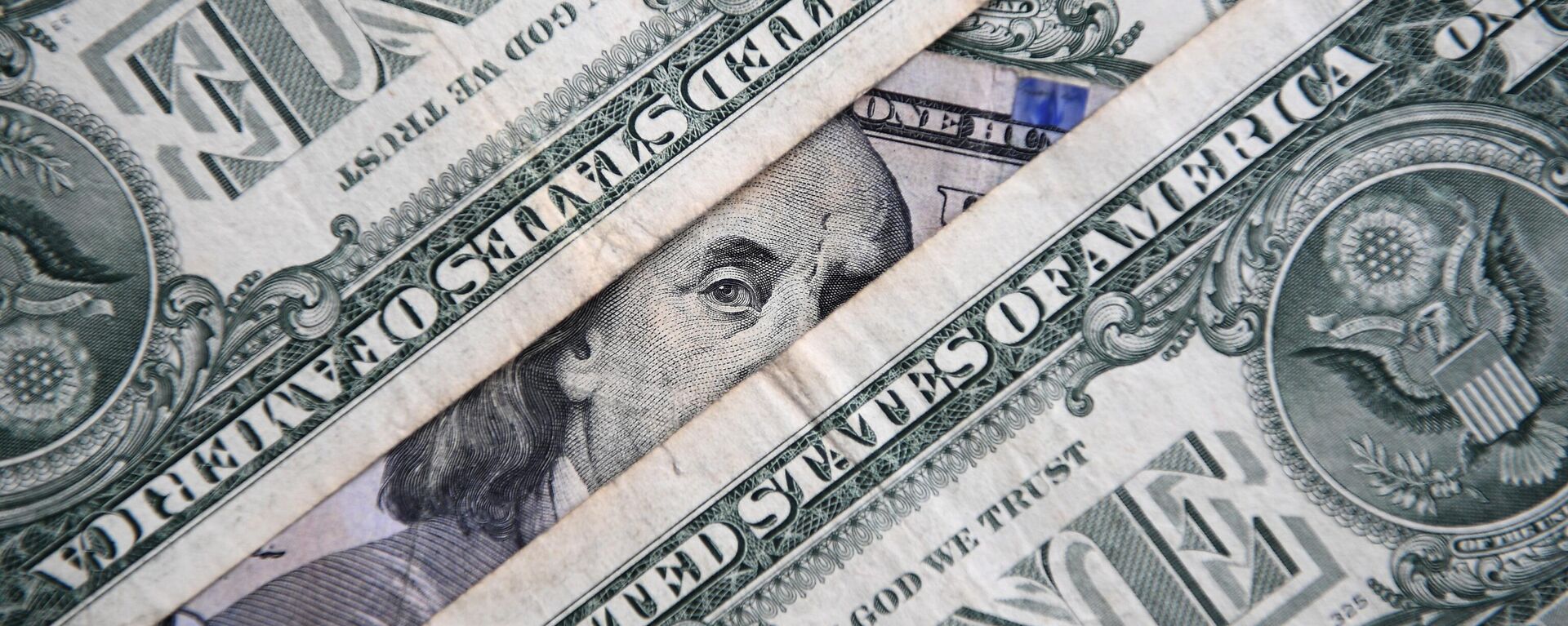https://sputnikglobe.com/20230530/us-debt-limit-deal-key-takeaways--what-comes-next-1110788787.html
US Debt Limit Deal: Key Takeaways & What Comes Next
US Debt Limit Deal: Key Takeaways & What Comes Next
Sputnik International
US Debt Limit Deal: Key Takeaways & What Comes Next
2023-05-30T11:58+0000
2023-05-30T11:58+0000
2023-05-30T11:58+0000
americas
us
joe biden
kevin mccarthy
republican
senate
us treasury
us debt ceiling crisis
janet yellen
https://cdn1.img.sputnikglobe.com/img/07e7/05/1e/1110786784_0:187:2980:1863_1920x0_80_0_0_544c426b5cf6d1fe134f8b6b70635038.jpg
After weeks of wrangling, Democratic President Joe Biden and Republican Speaker Kevin McCarthy struck an agreement in principle over the weekend in the form of a 99-page bill seeking to avert an imminent US default.A House vote on the cross-party agreement, which does not raise the government's borrowing limit, currently at $31.4 trillion, but rather suspends it until 2025, while imposing new caps on federal spending, is expected on May 31. The Senate will debate the legislation ahead of the so-called "X-date" - June 5 - when US Treasury Secretary Janet Yellen estimated the United States could reach the debt ceiling, raised to its current level under President Biden in 2021.Here are some takeaways from the nascent deal, and a look at what comes next.Spending CapsOverall, the legislation hammered out between the White House and Republican negotiators is estimated to reduce government spending by at least $1 trillion, according to reports, with official calculations pending.The proposed bill would retain non-defense spending, which covers areas like public education and transportation, approximately flat in the 2024 fiscal year. However, it would be raised 1% in 2025. $704 billion is allotted towards non-defense spending for the next fiscal year.Defense spending, however, would remain as Joe Biden proposed in his annual budget request - at $886bn - for fiscal year 2024, which amounts to a 3% rise on the current year. This increase is less than the inflation rate, which has been hovering just under 5%. For the following year, Defense spending would be capped at $895 billion.Federal budget growth, in line with the bill, would be limited to 1% for the next six years, according to the House GOP fact sheet.IRS, COVID-19 FundingThe proposed bill claws back some of the money that the Internal Revenue Service (IRS) was granted last year in Biden’s Inflation Reduction Act to crack down on tax fraud. $1.39 billion in IRS funds will be rescinded, with an additional $20 billion in appropriations funding to the IRS repurposed towards other non-defense discretionary spending during fiscal years 2024 and 2025. The White House agreed to additional cuts as part of the appropriations process, according to officials cited in media reports.The proposed legislation would also reportedly rescind around $30 billion in unused COVID-19 relief funding, approved by Congress via previous bills. Dozens of federal programs throughout the coronavirus pandemic were granted money. But after the public health emergency officially ended in May, Republicans insisted that the funds be returned.The legislation, however, retains funding for a program focused on rapidly developing the next generation of COVID-19 vaccines and treatments, veterans’ medical care, housing assistance, and the Indian Health Service.Work RequirementsThe bill is set to expand work requirements for certain adults receiving food stamps in line with the Supplemental Nutrition Assistance Program (SNAP). These would be temporarily broadened, gradually increasing the upper age limit to 55. Currently, work requirements are in place for most able-bodied adults between the ages of 18 and 49. The new provision expires in 2030, bringing the maximum age back down to 49.The legislation is said to make it somewhat harder for states to waive work requirements for SNAP for certain individuals, lowering the number of exemptions issued, and limiting states’ ability to carry over the number of exemptions from month to month. The agreement would make adjustments to the Temporary Assistance to Needy Families program, which provides cash aid to families with children. .VeteransThe proposed bill retains funding covering veterans' medical care. It also incorporates exemptions for veterans, homeless individuals, and former foster youth in the Supplemental Nutrition Assistance Program, otherwise known as the Food Stamps program. Out of DealLeft out of the new bill is Republican-passed legislation which would have created new work requirements for some Medicaid recipients. A GOP proposal to repeal some clean energy tax credits passed by Democrats last year is also absent, leaving Biden's much-touted Inflation Reduction Act's clean energy and climate provisions untouched. Similarly, the bill does not rescind Biden’s student loan relief, albeit it is currently being challenged in the Supreme Court. There are also no new tax hikes to target wealthy Americans - something that Democrats had argued for.Overall, ahead of the struck deal, the Congressional Budget Office (CBO) projected that next year would see $6.4 trillion in spending, with a deficit of $1.57 trillion. According to analysis of the text of the proposed bill in US media reports, the country is still heading for a spending spree of over $6 trillion in 2024.What Comes Next?Both Biden and McCarthy are likely to face opposition from their respective party members due to specific aspects of the deal that lawmakers from both sides of the aisle have criticized. The Democratic POTUS hailed the proposed legislation as a "compromise," saying that it "takes the catastrophic threat of default off the table" and protects US economic recovery.Before the House votes on the bill, the House Rules Committee has to hold a hearing at 3 p.m. Tuesday. Its task is to determine both, the rules, allowed amendments, and time for a debate on the proposed legislation. The committee has a 9-4 Republican majority. However, amid opposition to the legislation voiced by some Republicans, there have reportedly been suggestions to use the Rules Committee to block the package from reaching the House floor. Rep. Chip Roy (R-Texas) appeared to back this approach, tweeting on Monday that during January negotiations to elect McCarthy to the speakership, "it was explicit both that nothing would pass Rules Committee without AT LEAST 7 GOP votes - AND that the Committee would not allow reporting out rules without unanimous Republican votes."Three Republicans could be able to block the legislation if all four Democrats on the panel vote against. Two House Freedom Caucus members who slammed the deal are on the panel, Rep. Chip Roy, of Texas, and Rep. Ralph Norman, of South Carolina. However, regarding the “explicit” agreement mentioned by Roy, Rep. Dusty Johnson (R., SD) told reporters:"If those conversations took place, the rest of the conference was unaware of them. And frankly, I doubt that.” Next, passage in the House of Representatives requires support from 218 lawmakers if all members of the lower chamber vote. McCarthy has been upbeat, predicting that a majority of Republicans will support the bill, along with many Democrats. There have already been announced "defections" by at least six Republicans, according to US media reports, with Reps. Ralph Norman (R., S.C.), Chip Roy (R., Texas), Dan Bishop (R. N.C.), Bob Good (R., Va.), Matt Rosendale (R., Mont.), and Andy Biggs (R., Ariz.) all leery of the legislation. As Republicans have a narrow majority in the House - 222-213 - McCarthy can afford to lose no more than four Republicans without relying on Democratic votes.Once the bill clears the House, Senate Majority Leader Chuck Schumer (D., NY) said that he would, “move to immediately begin consideration of the agreement" in the upper chamber of the United States Congress.
https://sputnikglobe.com/20230529/text-of-us-biden-mccarthy-debt-ceiling-deal-bill-released-1110758898.html
https://sputnikglobe.com/20230529/why-debt-ceiling-deal-doesnt-mean-us-economy-out-of-woods-1110778935.html
americas
Sputnik International
feedback@sputniknews.com
+74956456601
MIA „Rossiya Segodnya“
2023
News
en_EN
Sputnik International
feedback@sputniknews.com
+74956456601
MIA „Rossiya Segodnya“
Sputnik International
feedback@sputniknews.com
+74956456601
MIA „Rossiya Segodnya“
democratic president joe bide, republican speaker kevin mccarthy, agreement in principle, bill on debt ceiling, suspends debt ceiling, government borrowing, us government default, avert a default, imminent us default, new caps on federal spending, educe government spending by at least $1 trillion, irs, covid-19 funding, work requirements, veterans' medical care,
democratic president joe bide, republican speaker kevin mccarthy, agreement in principle, bill on debt ceiling, suspends debt ceiling, government borrowing, us government default, avert a default, imminent us default, new caps on federal spending, educe government spending by at least $1 trillion, irs, covid-19 funding, work requirements, veterans' medical care,
US Debt Limit Deal: Key Takeaways & What Comes Next
A bipartisan deal finally brokered between US President Joe Biden and House Speaker Kevin McCarthy (R-Calif.) suspends the debt ceiling until 2025 and imposes caps on non-defense discretionary spending. McCarthy released the bill's text on Sunday evening, initiating the 72-hour review period before the House vote.
After weeks of wrangling, Democratic President Joe Biden and Republican Speaker Kevin McCarthy struck an agreement in principle over the weekend in the form of
a 99-page bill seeking to avert an imminent US default.
A House vote on the cross-party agreement, which does not raise the government's borrowing limit, currently at $31.4 trillion, but rather suspends it until 2025, while imposing new caps on federal spending, is expected on May 31. The Senate will debate the legislation ahead of the so-called "X-date" - June 5 - when US Treasury Secretary Janet Yellen estimated the United States could reach the debt ceiling, raised to its current level under President Biden in 2021.
Here are some takeaways from the nascent deal, and a look at what comes next.
Overall, the legislation hammered out between the White House and Republican negotiators is estimated to reduce government spending by at least $1 trillion, according to reports, with official calculations pending.
The proposed bill would retain non-defense spending, which covers areas like public education and transportation, approximately flat in the 2024 fiscal year. However, it would be raised 1% in 2025. $704 billion is allotted towards non-defense spending for the next fiscal year.
Defense spending, however, would remain as Joe Biden proposed in his annual budget request - at $886bn - for fiscal year 2024, which amounts to a 3% rise on the current year. This increase is less than the inflation rate, which has been hovering just under 5%. For the following year, Defense spending would be capped at $895 billion.
Federal budget growth, in line with the bill, would be limited to 1% for the next six years, according to the House GOP fact sheet.
The proposed bill claws back some of the money that the Internal Revenue Service (IRS) was granted last year in Biden’s Inflation Reduction Act to crack down on tax fraud. $1.39 billion in IRS funds will be rescinded, with an additional $20 billion in appropriations funding to the IRS repurposed towards other non-defense discretionary spending during fiscal years 2024 and 2025. The White House agreed to additional cuts as part of the appropriations process, according to officials cited in media reports.
The proposed legislation would also reportedly rescind around $30 billion in unused COVID-19 relief funding, approved by Congress via previous bills. Dozens of federal programs throughout the coronavirus pandemic were granted money. But after the public health emergency officially ended in May, Republicans insisted that the funds be returned.
The legislation, however, retains funding for a program focused on rapidly developing the next generation of COVID-19 vaccines and treatments, veterans’ medical care, housing assistance, and the Indian Health Service.
The bill is set to expand work requirements for certain adults receiving food stamps in line with the Supplemental Nutrition Assistance Program (SNAP). These would be temporarily broadened, gradually increasing the upper age limit to 55. Currently, work requirements are in place for most able-bodied adults between the ages of 18 and 49. The new provision expires in 2030, bringing the maximum age back down to 49.
The legislation is said to make it somewhat harder for states to waive work requirements for SNAP for certain individuals, lowering the number of exemptions issued, and limiting states’ ability to carry over the number of exemptions from month to month. The agreement would make adjustments to the Temporary Assistance to Needy Families program, which provides cash aid to families with children. .
The proposed bill retains funding covering veterans' medical care. It also incorporates exemptions for veterans, homeless individuals, and former foster youth in the Supplemental Nutrition Assistance Program, otherwise known as the Food Stamps program.
Left out of the new bill is Republican-passed legislation which would have created new work requirements for some Medicaid recipients. A GOP proposal to repeal some clean energy tax credits passed by Democrats last year is also absent, leaving Biden's much-touted Inflation Reduction Act's clean energy and climate provisions untouched. Similarly, the bill does not rescind Biden’s student loan relief, albeit it is currently being challenged in the Supreme Court. There are also no new tax hikes to target wealthy Americans - something that Democrats had argued for.
Overall, ahead of the struck deal, the Congressional Budget Office (CBO) projected that next year would see $6.4 trillion in spending, with a deficit of $1.57 trillion. According to analysis of the text of the proposed bill in US media reports, the country is still heading for a spending spree of over $6 trillion in 2024.
Both Biden and McCarthy are likely to face opposition from their respective party members due to specific aspects of the deal that lawmakers from both sides of the aisle have criticized. The Democratic POTUS
hailed the proposed legislation as a "compromise," saying that it "
takes the catastrophic threat of default off the table" and protects US economic recovery.
Before the House votes on the bill, the House Rules Committee has to hold a hearing at 3 p.m. Tuesday. Its task is to determine both, the rules, allowed amendments, and time for a debate on the proposed legislation. The committee has a 9-4 Republican majority.
However, amid opposition to the legislation voiced by some Republicans, there have reportedly been suggestions to use the Rules Committee to block the package from reaching the House floor. Rep. Chip Roy (R-Texas) appeared to back this approach, tweeting on Monday that during January negotiations to elect McCarthy to the speakership, "it was explicit both that nothing would pass Rules Committee without AT LEAST 7 GOP votes - AND that the Committee would not allow reporting out rules without unanimous Republican votes."
Three Republicans could be able to block the legislation if all four Democrats on the panel vote against. Two House Freedom Caucus members who slammed the deal are on the panel, Rep. Chip Roy, of Texas, and Rep. Ralph Norman, of South Carolina. However, regarding the “explicit” agreement mentioned by Roy, Rep. Dusty Johnson (R., SD) told reporters:
"If those conversations took place, the rest of the conference was unaware of them. And frankly, I doubt that.”
Next, passage in the House of Representatives requires support from 218 lawmakers if all members of the lower chamber vote. McCarthy has been upbeat, predicting that a majority of Republicans will support the bill, along with many Democrats. There have already been announced "defections" by at least six Republicans, according to US media reports, with Reps. Ralph Norman (R., S.C.), Chip Roy (R., Texas), Dan Bishop (R. N.C.), Bob Good (R., Va.), Matt Rosendale (R., Mont.), and Andy Biggs (R., Ariz.) all leery of the legislation. As Republicans have a narrow majority in the House - 222-213 - McCarthy can afford to lose no more than four Republicans without relying on Democratic votes.
Once the bill clears the House, Senate Majority Leader Chuck Schumer (D., NY) said that he would, “move to immediately begin consideration of the agreement" in the upper chamber of the United States Congress.
"Due to the time it may take to process the legislation in the Senate without cooperation, Senators should prepare for potential Friday and weekend votes,” Schumer wrote in a letter to his Democratic colleagues.





